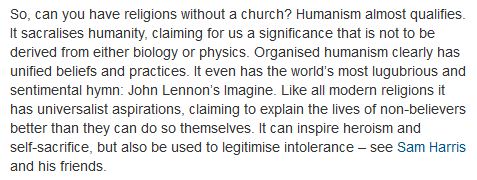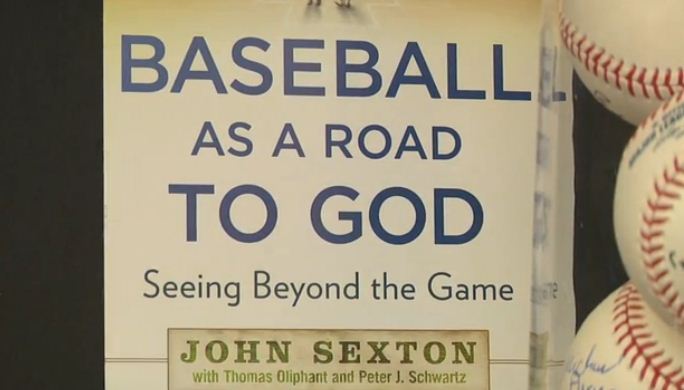 The curious thing about the discourse on religion is that the category purports to be a completely totalized notion, all-inclusive of everything, inasmuch as it is often used as if it names some deeply human yearning or sentiment/experience, making it synonymous with “the human condition” or maybe even “culture” itself. Thus, the category has to be applicable to everything it is that we do or produce — after all, if baseball can be religion, then what can’t?
The curious thing about the discourse on religion is that the category purports to be a completely totalized notion, all-inclusive of everything, inasmuch as it is often used as if it names some deeply human yearning or sentiment/experience, making it synonymous with “the human condition” or maybe even “culture” itself. Thus, the category has to be applicable to everything it is that we do or produce — after all, if baseball can be religion, then what can’t?
So even when people claim not to have a religion, sooner or later someone will find that they do and they didn’t even know it. For instance, consider the headline at the top of this post (click it for the article), in which we learn:
 So if you’re trying to study not religion but the discourse on religion — the conditions that allow us to name something as religious or not, to treat it in some special way (whether for good or ill) in order to relate it (or not) to any of the many other things we do or say — keep your eyes open for how this totalized category is used. And then ask yourself whether the people using it are just describing the world as they happen to find it or, instead, whether they are creating the impression of a particular sort of world, comprised of particular sorts of humans in particular sorts of relationships with one another, by whipping out this apparently all-inclusive, one-size-fits-all term that’s never met a situation that it couldn’t handle.
So if you’re trying to study not religion but the discourse on religion — the conditions that allow us to name something as religious or not, to treat it in some special way (whether for good or ill) in order to relate it (or not) to any of the many other things we do or say — keep your eyes open for how this totalized category is used. And then ask yourself whether the people using it are just describing the world as they happen to find it or, instead, whether they are creating the impression of a particular sort of world, comprised of particular sorts of humans in particular sorts of relationships with one another, by whipping out this apparently all-inclusive, one-size-fits-all term that’s never met a situation that it couldn’t handle.
Now, speaking as a scholar of religion, that’s precisely why the term “religion” is not very useful to me — because it’s endlessly useful to others. To put it another way: the beauty of “zero” or “tractor,” or what about “computer chip” and “TV tray,” is that they only apply to certain things in the world — a delimited domain — and thus it isn’t difficult to find something that is not a toe or not cotton candy, thus making them pretty handy tools for focusing attention by picking out some specific set of things for this or that reason. But because it is used as if its relevance is limitless, as if the term is always on duty, the category religion is a different sort of concept, doing different sort of work for people. And that’s why I think it more interesting to study the very category itself — its history, how and when people use it, and what they say they mean by it — than to just use it as if it names some actual thing in the room or nestled deep in the heart.
